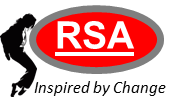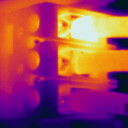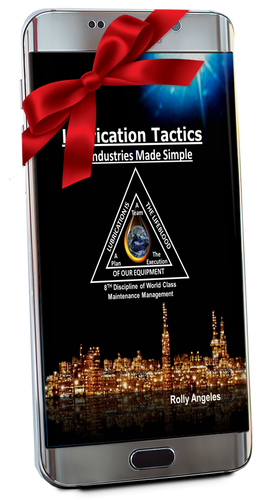

RSA Online E-Book Store
These books are written for maintenance people in industries seeking better ways of improving their equipment and assets. If you are living the day to day pressures of doing maintenance, then these books are written for you.
My Mission
Lubrication Tactics Made Simple for Industries (E-book Readable Version)
The subject of lubrication is very broad indeed and is evolving continuously with new technologies and developments as time passed by. As a result, some of the things that have been written and published are now by-gone and obsolete. While most maintenance and lubrication people I know are not educated properly on lubrication.Most of their decision on which lubricant to use and when to change it is based most often on OEM recommendations. The purpose of writing this book on Lubrication Tactics for Industries Made Simple is to provide the maintenance people and the lubricant users in industries an easy-to-understand and straightforward approach to lubrication that they can adapt easily in their plant. Some of the highlights that are covered in this book include the following:
- Why There is No Lubrication Engineering Course in College?
- Selecting the Correct Lubricating Oil for the Equipment
- Can We Mixed Different Grades and Brands of SAE Engine Oil?
- Grease Incompatibility Issue
- Advantages of Synthetic Oil over Petroleum Oil
- Frequently Asked Questions on Synthetic Oil
- Different Viscosity Grades for Industrial Lubricants
- Does Lubricating Oil Really Wear Out?
- Six Myths About Lubrication
- Ten Strategies to Adapt to Lubrication and Contamination Control
- Why is the Study of Tribology Important to Industries?
- Why Lubrication Failures Repeat Itself
- Benefits of Oil Analysis
- Why Does Oil Analysis Program Fail in Some Industries?
- Tips in Conducting Oil Analysis
- Lubrication Tactics on Lubricating Oil
- Lubrication Tactics on Oil Contamination Control(Code)
- Lubrication Tactics on Greasing
- Steps on Adopting a Lubrication Strategy
The costs of lubricants in any industry only tell us one side of the story since we only talk about the cost of lubricants spent on the equipment. The much higher cost can be seen in the number of breakdowns and failures encountered daily caused by incorrect practices and myths on lubrication. The costs of failures attributed to lubrication are a minimum of 2 folds the costs of lubricants that you consumed in the equipment. This means that if you are a heavy user of lubrication, such as a mining industry whose cost of lubricants is 100,000 USD a month, multiply this by a minimum of two. That will be the costs attributed to lubrication failures. Contamination is the main problem with lubrication, and it has always been there in the equipment, and it comes not only in solid form but in liquid and air (bubbles). The author believes that the more contamination present in lubricating oil, then the more chances that failures happen, not only in hydraulics but in all lubricating systems and what we can do about it. Whether your industry is a large consumer or not of lubricants, there are way too many problems experienced by maintenance people regarding lubrication. Here are some of the most common problems industries are experiencing right now in today's operations. We have problems with bearing failures, oil leakage, lack of procedure, human errors of mixing lubricants, wrong or obsolete procedures on lubrication, spillages, over lubrication, under lubrication, abrasion, oil contamination problems, premature failures, improper storage of new lubricants, grease incompatibility issues, high lubrication costs, guesstimate on greasing interval, lack of knowledge, cost-cutting schemes on lubrication training, and you name it. I'm pretty sure there are more besides these lists. This book contains 12 chapters, and each chapter is summarized and intended to help industries find the key to managing their lubrication.I hope this book reached out to industries in search of improving their overall lubrication strategy and benefit from the process.
Rolly, your people-focus on reliability improvement and your commitment to helping people grow through improving their understanding of equipment and of themselves come through loud and clear in the book. The workplace stories you tell will resonate with people working in operations and maintenance in every industry. I very much like that you have provided practical answers with explanations and examples of how companies can move up the path to world-class maintenance performance. You have written about TPM, RCM, and RCA with great passion and an obvious depth of knowledge and experience. I’ve learned much more about the right way to use those tools by reading your book than I ever understood before. There is no doubt that the World Class Maintenance Management - The 12 Disciplines book will become a well-thumbed reference book for me. Rolly, I’ve been fortunate to come across you and value your honest perspectives and insights on doing maintenance right. I share your desires for what maintenance can become and do for a company and hope that we can combine our efforts in the future.

This new book published in May 2020 is by far the most comprehensive maintenance management book written to date. That includes my Handbook of Maintenance Management. In 344 pages he lays out the history of maintenance management and the state of the art today. Rolly has deep experience and understanding in both RCM and TPM (an unusual combination) which adds depth to the discussion. He includes a detailed and practical glossary of keywords and their meanings. I want to make a few specific points. The assessment tool is great, and I will definitely upgrade my own assessment tool with his improvements. It covers all aspects of managing maintenance. Asset management: This is one of the best introductions to asset management and detailed rundown of ISO 5500X I've read. It shows through examples of how asset management can help the organization's effectiveness. Life cycle management is certainly part of asset management. In this case, the life cycle discussion shows definitively how most of the reliability is not under the control of the maintenance function. He says that reliability is a company's responsibility. Good graphics on the iceberg of costs to own and run a machine. Good maintenance practices may require a change in the corporation. The section on change management is well thought out and complete. Congratulations on publishing what will become the standard text in the field.

This book contains significant and relevant theory and idealism. I never read this kind of book before but it hits the core value of TPM. It is indeed maintenance quite necessary in any kind of manufacturing company. I salute for all technicalities which I don’t know it comes from before, I have learned a lot from this book. As technical personnel, I can say that it’s very much informative and vibrant. It makes a lot of sense in dealing with the alternative way of maintenance. All throughout, I was amazed by the author’s knowledge. Proud being a Filipino. Thank you for sharing this kind of book with us the author is really a mastermind on this TPM world. I absolutely enjoyed reading it even though I’m not really a reading enthusiast. I miss the Rolling Stone part which you gave the color on this book. Kudos Mr. Rolly Angeles for a good job. I now truly understand and felt being one of the maintenance team. This book has a heart and is very lively. I hope you continue to spread the meaningful story of the maintenance people. We owe you all the knowledge and being a part of this team review. Congratulations Mr. Rolly this is a heck of success. Thank you.

First I want to thank you Mr. Rolly for giving me this very rare opportunity to comment in a book and have my comment in print. At first, I was wondering where would this book lead me? Your quote “changing a system means changing a culture” captured my attention. So as I read, I already knew I need to finish reading this book. I can relate to most of what was illustrated, stated, and example in this book. They’re all true and happening. A reality. I dreamed of having a kind of maintenance organization such as those described. My only worry is that I am not in the position to implement such. It is true that this kind of approach should be top to bottom, no support from upper management means you’ll end up to nothing. I am a maintenance guy and proud to be one. But it is great to know somebody that dedicates too much time and adheres to improve the lives of maintenance people like Rolly Angeles.

The Author

Rolly Angeles
store owner
Rolly is a seasoned international maintenance and reliability consultant with over 30 years of solid experience in the field. He has been invited to different countries and has conducted reliability and maintenance training in United Arab Emirates, Qatar, India, Malaysia, Indonesia, Brunei, Thailand, Nigeria, Bangladesh, South Africa, China, and Botswana. His portfolio of maintenance training includes maintenance and reliability courses on TPM, Lubrication, Tribology, Condition-Based Maintenance, RCM, RCFA, Planned Maintenance, World Class Maintenance Management, The 12 Disciplines, Oil Contamination Control, Maintenance Indices and KPI’s, Maintenance and Reliability Management Strategies and much more. Rolly previously worked with Amkor Technology Philippines, as a TPM Senior Engineer, an industry engaged in the manufacture of Integrated Circuit products and spearheaded their Planned Maintenance organization which composed of maintenance managers and engineers.
With 30 years of solid experience, he had worked in various industries from shipping, woodworking, foundry, cast-iron machining, assembly lines, semiconductor manufacturing, and mining industry. Here was where he gained hands-on experience and understanding of both TPM and RCM respectively, a strategy from both the west and the east. His last corporate employment was in 2002 where he worked as a technical training specialist at Lepanto Consolidated Mining Industry. In 2005, Rolly retired early from the industry and decided to establish his own consulting business, RSA Reliability and Maintenance Consultancy Firm where he dedicates his time and passion to work as a maintenance consultant. He provides in-house training, consultation, and facilitation to different industries on maintenance and reliability’s best practices.
